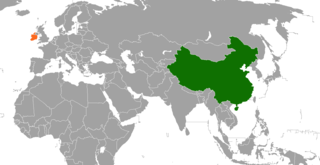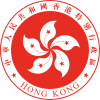
The politics of Hong Kong takes place in a framework of a political system dominated by its quasi-constitutional document, the Hong Kong Basic Law, its own legislature, the Chief Executive as the head of government and of the Special Administrative Region and of a politically constrained multi-party presidential system. The Government of the Hong Kong Special Administrative Region of the People's Republic of China is led by the Chief Executive, the head of government.

The special administrative regions (SAR) of the People's Republic of China are one of four types of province-level divisions of the People's Republic of China directly under the control of its Central People's Government, being integral areas of the country. As a region, they possess the highest degree of autonomy from China's central government. However, despite the relative autonomy that the Central People's Government offers the special administrative regions, the National People's Congress and its Standing Committee remains capable of enforcing laws for the special administrative regions.

The Taipei Economic and Cultural Representative Office (TECRO), also known as Taipei Economic and Cultural Office (TECO), Taipei Representative Office (TRO) or Taipei Mission, is an alternative diplomatic institution serving as a de facto embassy or a consulate of the Republic of China to exercise the foreign affairs and consular services in specific countries which have established formal diplomatic relations with the People's Republic of China. The PRC denies the legitimacy of the ROC as a sovereign state and claims the ROC-controlled territories as an integral part of its territory. An exclusive mandate, namely One-China policy, requires that any country wishing to establish a diplomatic relationship with the PRC must first sever any formal relationship with the ROC. According to The Fletcher Forum of World Affairs, "non-recognition of the Taiwanese government is a prerequisite for conducting formal diplomatic relations with the PRC—in effect forcing other governments to choose between Beijing and Taipei." As a result, these countries only allow the ROC to establish representative offices instead of a fully-fledged embassy or consulate for the purpose of conducting practical bilateral relations without granting full diplomatic recognition.

The handover of Hong Kong from the United Kingdom to the People's Republic of China was at midnight on 1 July 1997. This event ended 156 years of British rule in the former colony, which began in 1841.

The Hong Kong Special Administrative Region passport is a passport issued only to permanent residents of Hong Kong who also hold Chinese citizenship. In accordance with the Basic Law of the Hong Kong Special Administrative Region, since the handover in 1997, the passport has been issued by the Immigration Department of the Government of Hong Kong under the authorisation of the Central People's Government of the People's Republic of China. As the official languages of Hong Kong are Chinese and English, the passport is printed bilingually in both Chinese and English. In addition, unlike Chinese passport which can be issued by Chinese diplomatic missions abroad, the Immigration Department of Hong Kong is the only issuing authority for HKSAR passports.

Chinese-United Kingdom relations, more commonly known as British–Chinese relations, Anglo-Chinese relations and Sino-British relations, are the interstate relations between China and the United Kingdom.

Under the Basic Law, Macau's diplomatic relations and defence are the responsibility of the central government of China. Except diplomatic relations and defence, nonetheless, Macau has retained considerable autonomy in all aspects, including economic and commercial relations, customs control.

The handover of Macau from the Portuguese Republic to the People's Republic of China was at midnight on 20 December 1999. This event ended 442 years of Portuguese rule in the former settlement, which began in 1557.

The British Consulate General Hong Kong (BCGHK), located at 1 Supreme Court Road, Admiralty, Hong Kong Island, is one of the largest British consulates general in the world and is bigger than many British embassies and high commissions. It is responsible for maintaining British ties with Hong Kong and Macau.

There are 122 diplomatic missions in Hong Kong, of which 61 are consulates-general and 61 are consulates and six officially recognised bodies in Hong Kong. As Hong Kong has the status of a Special Administrative Region of the People's Republic of China, some consuls-general in Hong Kong report directly to their respective foreign ministries, rather than to their Embassies in Beijing.

The Hong Kong Economic and Trade Office London is Hong Kong's representation in the United Kingdom. Apart from the United Kingdom, the Office is responsible for fostering trade and economic relations with countries including Denmark, Estonia, Finland, Latvia, Lithuania, Norway, Russia and Sweden. The Office promotes bilateral trade with and investment in Hong Kong, updates the business communities and multiplier organisations on important developments in Hong Kong. It also organizes official visits, seminars and liaison events in the countries concerned, and acts as a hub to support investors from these countries in their search for business opportunities in Hong Kong and mainland China.

Hong Kong–United States relations are bilateral relations between Hong Kong and the United States.

The China–New Zealand relations, sometimes known as Sino–New Zealand relations, are the relations between China and New Zealand. New Zealand recognised the Republic of China after it lost the Chinese Civil War and retreated to Taiwan in 1949, but switched recognition to the People's Republic of China on 22 December 1972. Since then, economic, cultural, and political relations between the two countries have grown over the past four decades. China is New Zealand's largest trading partner in goods and second largest trading partner in services. In 2008, New Zealand became the first developed country to enter into a free trade agreement with China. In recent years, New Zealand's extensive economic relations with China have been complicated by its security ties to the United States.

China–Ireland relations are interstate relations of China and Ireland. Ireland and China first established their bilateral foreign relations after they signed the Communique on the Establishment of Diplomatic Relations on 22 June 1979. This milestone opened the gate for trades, businesses, politics, education, and tourism between the two countries; both nations have gained enormous growth of economic values. Both countries exchanged ambassadors in 1980. Ireland has an embassy in Beijing, a general consulate in Shanghai and an honorary consulate in Hong Kong; China has an embassy in Dublin. The first historical meeting for the two headers of China and Ireland governments took place in November 1996 when Premier Li Peng met with Taoiseach John Bruton at the World Food Summit. By 2019, this bilateral relationship has boomed to a high point, and a ceremony of their 40th anniversary of diplomatic relations was held in Dublin, Ireland in June 2019.

Relations between Barbados and China began on 4 September 1967 with Barbados recognizing the People's Republic of China from 30 May 1977, just over one decade after the eastern Caribbean island nation's independence from the United Kingdom.
A de facto embassy is an office or organisation that serves de facto as an embassy in the absence of normal or official diplomatic relations among countries, usually to represent nations which lack full diplomatic recognition, regions or dependencies of countries, or territories over which sovereignty is disputed. In some cases, diplomatic immunity and extraterritoriality may be granted.

China–Peru relations are foreign relations between the People's Republic of China and the Republic of Peru. Peru is the first Latin American country that China established formal ties with, which was done by the Qing dynasty in August 1875. Both nations are members of the Asia-Pacific Economic Cooperation and the United Nations.

Hong Kong–United Kingdom relations are the international relations between the post-colonial Hong Kong and the United Kingdom. Hong Kong was a British colony from 1841 to 1941 and again from 1945 to 1997 when sovereignty was handed over to China. UK policy towards Hong Kong is underpinned by its substantial commercial interests, and fulfilling obligation as the other signatory of Sino–British Joint Declaration on the future of Hong Kong, in addition to support Hong Kong's mini-constitution, the Basic Law, and in accordance with China's policy of observing "one country, two systems". Hong Kong is also home to roughly 2.9 million British nationals, 350,000 of which hold an active British passport, giving it one of the largest populations of British passport holders in the world behind only the Anglosphere Commonwealth realms and the United States.

Hong Kong–India refers to the bilateral relations between India and Hong Kong. India has a consulate general in Hong Kong.

France–Hong Kong relations refers to international relations between France and Hong Kong.



























